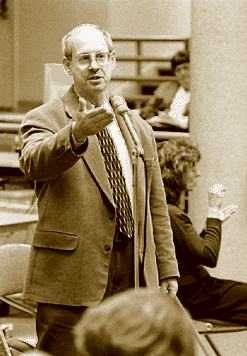Next Profile
Achievement Profile: Stephen Krashen
"So Many Years Left, So Many Languages to Acquire!"
His "natural approach" and incorporation of Chomsky's hypothetical language acquisition
device (LAD) radically changed the ESL profession. The ESL MiniConference
Online is pleased to share Stephen Krashen's comments from our
recent interview.
Some Stephen Krashen links:
Looking for Bilingual Answers (2000)
What is your main ESL activity now? What are your
principal projects, and what is on the back burner?
I am currently active in several related fields. I have devoted a lot of time over the last five years to defending whole language and bilingual education. Contrary to what one reads in the media in the United States, both have been very successful and the research solidly supports both. Children in classes in which there is more real reading do better, and children in well-designed bilingual education programs acquire their second language quite well.
I've devoted a lot of time recently to research on recreational reading, or "free voluntary reading." I think it is the most powerful tool we have in language education, first and second. Another continuing interest is in writing and creativity (eg writing blocks).
And of course I have continued active work in second language acquisition.
How did you start your ESL career? Who influenced
your decision? What were some important formative
experiences in the early stages of your development?
I am a recovering linguist. I have a PhD in linguistics and studied grammar, and language and the brain. It never occurred me that there was any other way of developing language ability in adults other than learning rules and correcting errors until 1975 when I encountered research results that could not be explained that way. The results pointed to the hypothesis that language acquisition and learning were different, and that acquisition was far more important. Since then, research has confirmed this countless times, in my opinion. I also realized that I had misinterpreted my own experiences with language acquisition.
What are the four or five language/culture backgrounds
with which you are most familiar as a teacher? Which
ones are you familiar with from the perspective of a
language learner yourself? What insights have you
gained in how to meet the needs of English learners
from these cultures and language backgrounds?
In terms of my own language acquisition: I was given a passing grade in high school French under the condition that I never study French again. The teacher did not want to spoil my academic record, but did not want to take responsibility for my terrible performance. I've done better since then: German (I was a music student in Vienna in 1962, did great in German, lousy in piano), French (from France, a little, and more from my sabbatical in Ottawa), Hebrew from the kibbutz in the 1960's, Amharic from Peace Corp (1964-66), Yiddish, which got a big boost from German, and I'm trying to improve in Spanish.
About six years ago I met a woman in Hungary named Lomb Kato, a professional translator who had acquired 17 languages. At the time we met she was 86. Her last words to me changed my life: "Stephen, you are so young. So many years left, so many languages to acquire!" (I was 54 at the time.) What an inspiration! Since then I have plunged back into second language acquisition. I have been pleasure reading in at least one foreign language every day since then, focusing on very light pleasure reading, which is lots of fun and relaxing. (Usually I alternate novels in French and German, and read even easier things in my limited Spanish, such as novellas.) This constant pleasure reading has confirmed my belief that recreational reading is a very good practice for low intermediate and intermediate language acquirers.
If you had to give three pieces of advice to a
new ESL teacher, what would they be?
1) Read for pleasure in your own second language(s).
Interviewed by Robb Scott
2002 ESL MiniConference Online
Condemned Without a Trial: Bogus Arguments Against Bilingual Education
(1999)
Bridging Inequity with Books (1998)
Principles of English as a Foreign Language (1996)
Self-Correction and the Monitor: Percent of Errors Corrected of Those Attempted vs. Percent Corrected of All Errors Made (1994)
How Much Comprehensible Input Did Heinrich Schliemann Get? (1991)
We Acquire Vocabulary and Spelling by Reading: Additional Evidence for the Input Hypothesis (1989)
The Natural Approach: Language Acquisition in the Classroom (1983)
Age, Rate and Eventual Attainment in Second Language Acquisition (1979)
Is the "Natural Order an Artifact of the Bilingual Syntax Measure? (1978)
Maturational Constraints on Second Dialect Acquisition (1975)
The Major Hemisphere (1975)
An ESL MiniConference Online interview
with Stephen Krashen:
2) Read everything written by Frank Smith and Jim Trelease.
3) Stay away from junk food.